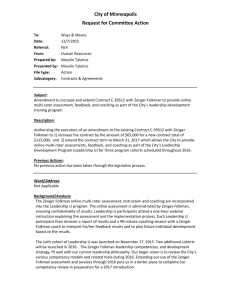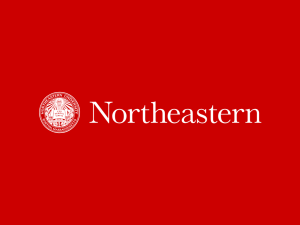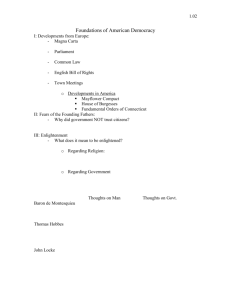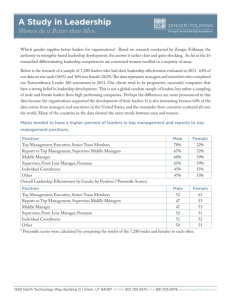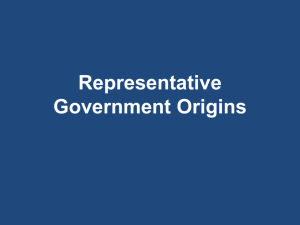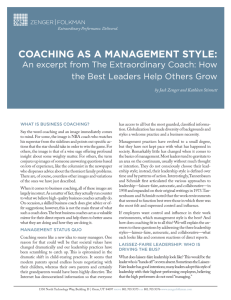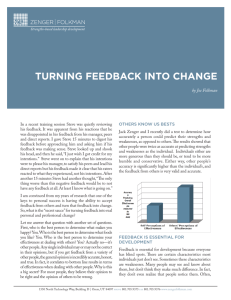pages 1-5 - Zenger Folkman
advertisement
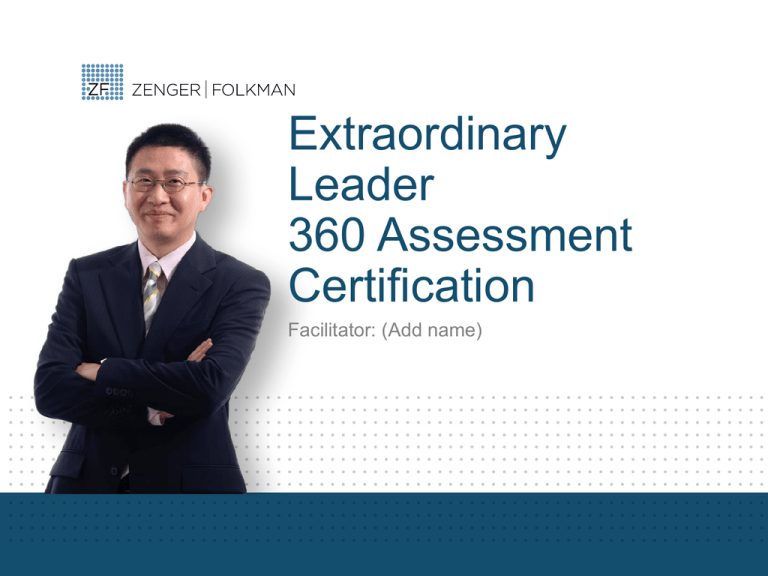
Extraordinary Leader 360 Assessment Certification Facilitator: (Add name) Workshop Objective Prepare you to hold Extraordinary Leader coaching conversations that will help leaders: • Understand the strengths-based approach • Interpret their 360 feedback reports • Build effective development plans 2 © Zenger Folkman 2015 - ELAC51.3.1 The Extraordinary Leader 360 Assessment Certification (“ELAC”) • The Extraordinary Leader: Key Concepts for Coaches • Interpreting The Extraordinary Leader Assessment Report • Leading an Extraordinary Leader Coaching Conversation • Putting It All Together: A Coaching Conversation Simulation • Coaching Questions, Issues, and Options • Close and Q&A 3 © Zenger Folkman 2015 - ELAC51.3.1 ELAC Coaching Materials 1. 2. 3. 4. EL Development Guide OR EL Participant Manual ELAC Workshop Coaching Guide ELAC Job Aid Card ELAC CD for Coaches: a. Items you may choose to send prior to coaching session: i. Introduction/Prework Letter (Template) ii. White Paper: Leadership Under the Microscope iii. Step-by-step Analysis Form b. Items you may want to use during coaching session: i. 2-Hour Coaching Conversation Guide (in Word format) ii. 11 Key Concepts for Coaches Pages iii. Extraordinary Leader Development Plan (“ELDP”) Form iv. CPO Matrix Form v. Action Item Checklist Form c. White Paper for your review: Bringing Science to the Art of Coaching 4 © Zenger Folkman 2015 - ELAC51.3.1 The Extraordinary Leader: Key Concepts for Coaches Module 1 Objectives Original EL Data Research Result? Current EL Data? • 100 different companies • 32 data sets • 1,956 survey items • 237,123 survey responses • 26,314 leaders • New, strengths-based leadership insights and points of view • The 16 Differentiating Competencies • Creation of the EL 360 survey: items that measure leader effectiveness in the 16 DC’s • 500+ companies • 1 data set • 54 survey items • 400,000+ surveys on 40,000+ leaders • EL norms (comparative percentile scores) 6 PAGE 1-1 © Zenger Folkman 2015 - ELAC51.3.1 Comparative Percentile Scores • Much broader range of percentiles scores to analyze 360 assessment reports • Displayed by Tent Pole and by Differentiating Competency • Updated periodically 7 PAGE 1-2 © Zenger Folkman 2014 The Extraordinary Leader: 11 Key Concepts for Coaches • Use from PM to guide, teach during coaching conversation • CD has reproducible copy 8 PAGES 1-5 – 1-27 © Zenger Folkman 2015 - ELAC51.3.1 The Extraordinary Leader Coaching Objective To complete a joint interpretation of your 360 report and help you create a strengths-based personal leadership development plan to become an Extraordinary Leader 9 PAGES 1-5 © Zenger Folkman 2015 - ELAC51.3.1 Leaders Measurably Impact Organizational Results Good does not equal great: Extraordinary Leaders make a significant, measurable difference 10 PAGES 1-7 © Zenger Folkman 2015 - ELAC51.3.1 Why Leaders Focus on Building Strengths You don’t have to be perfect to be an extraordinary leader … 100 90 (average percentile score) 91 4 5 81 80 Overall Leadership Effectiveness 89 72 70 64 60 50 40 34 30 20 10 0 0 1 2 3 Number of Profound Strengths (Profound strength = 90% or higher) 11 PAGE 1-9 © Zenger Folkman 2015 - ELAC51.3.1 An Exception: Be Aware of Potential Fatal Flaws Signs: • low scores or consistent negative feedback • poor or even average capability in a job-critical area • inattention to a key cultural value or other trait critical to your organization • has potential to derail your job or career 12 PAGE 1-11 © Zenger Folkman 2015 - ELAC51.3.1 Perceptions of You Are Others’ Reality How people would objectively evaluate us How people really evaluate us Trait F Trait F Trait E Trait A Impression Trait D Trait A Trait B Trait E Trait C Impression Trait D Trait B Trait C 13 PAGE 1-13 © Zenger Folkman 2015 - ELAC51.3.1 Establish your baseline To get where you want to go, you need to know where you are 14 PAGE 1-15 © Zenger Folkman 2014 15 PAGE 1-17 © Zenger Folkman 2015 - ELAC51.3.1 16 Competencies That Differentiate Extraordinary Leaders Focus on results • Drive for results • Establishes stretch goals • Takes initiative Personal capability • Technical/ professional expertise Character • Displays high integrity and honesty • Solves problems and analyzes issues Leading change • Develops strategic perspective • Communicates powerfully and prolifically • Champions change • Inspires and motivates others to high performance • Connects the group to the outside world • Innovates • Practices selfdevelopment Interpersonal skills • Builds relationships • Develops others • Collaboration and teamwork 16 PAGE 1-19 © Zenger Folkman 2015 - ELAC51.3.1 SARA: Common Reactions to Direct Feedback S A R A Surprise, Shock Anger, Anxiety Rejection, Rationalization Acceptance 17 PAGE 1-21 © Zenger Folkman 2015 - ELAC51.3.1 Work Environment When Choosing Strengths to Develop, Play to Your Passions Leadership Sweet Spot 18 PAGE 1-23 © Zenger Folkman 2015 - ELAC51.3.1 Leadership Cross-Training Can Be Trusted to Act in the Team’s Best Interest Honesty and Integrity Solves Problems and Analyzes Issues Technical/ Professional Expertise When building on strengths, often the best approach is to build around them Relationship Building and Networking Communicates Powerfully Desires to Pursue Excellence Develops Others Takes Initiative 19 PAGE 1-25 © Zenger Folkman 2015 - ELAC51.3.1 Have a Plan to Involve Others in Your Development 20 PAGE 1-27 © Zenger Folkman 2015 - ELAC51.3.1 Interpreting The Extraordinary Leader Assessment Report Module 2 Table of Contents 22 PAGE 2-1 © Zenger Folkman 2014 Section 1: How to Interpret Your Feedback 23 PAGE 2-2 © Zenger Folkman 2014 Section 1: Your Respondents 24 PAGE 2-3 © Zenger Folkman 2014 Section 2: Overall Leadership Effectiveness Index 25 PAGE 2-4 © Zenger Folkman 2014 Section 3: Leadership Tent Model 26 PAGE 2-5 © Zenger Folkman 2014 Section 4: 16 Differentiating Competencies Summary 27 PAGE 2-6 © Zenger Folkman 2014 Section 5: 16 Differentiating Competencies w/ Item Details 28 PAGE 2-7 © Zenger Folkman 2014 Section 6: Employee Commitment Index 29 PAGE 2-8 © Zenger Folkman 2014 Section 7: Importance Ratings 30 PAGE 2-9 © Zenger Folkman 2014 Sections 8 and 9: Highest and Lowest Scored Items 31 PAGE 2-10 and 2-11 © Zenger Folkman 2014 Section 10: Written Comments 32 PAGE 2-12 © Zenger Folkman 2014 Section 11: Supplemental View: Leadership Tent Model 33 PAGE 2-14 © Zenger Folkman 2014 Section 12: Supplemental View: 16 Differentiating Competencies 34 PAGE 2-14 © Zenger Folkman 2014 Section 13: Supplemental View: Differences in Perception 35 PAGE 2-15 © Zenger Folkman 2014 Frequently Asked Questions 36 PAGE 2-16 – 2-26 © Zenger Folkman 2015 - ELAC51.3.1 Interpretation Practice Case Studies • Case study: Carol Curious –Individually: • Review Carol’s 360 feedback report (green) • Complete a Case Study Worksheet (page 2-31) –35 minutes 37 PAGE 2-29 © Zenger Folkman 2015 - ELAC51.3.1 Interpretation Practice Case Studies • Case study: Ian Introuble –In pairs: • Review Ian’s 360 feedback report • Complete a Case Study Worksheet (page 2-71) –35 minutes 38 PAGE 2-69 © Zenger Folkman 2015 - ELAC51.3.1 Leading An Extraordinary Leader Coaching Conversation Module 3 The FUEL Model A simple framework used to guide effective coaching conversations Step One: Frame the Conversation Step Two: Understand the Current State Step Three: Explore the Desired State Step Four: Lay Out a Success Plan 40 PAGE 3-1 © Zenger Folkman 2015 - ELAC51.3.1 Leading an EL Coaching Conversation Overview of the 2-Hour Coaching Conversation Guide: • Assumes Coachee has: — not been through EL workshop — reviewed 360 report and completed Step-by-step Analysis as prework • Objective: help Coachee interpret their 360 and build a strengths-based plan • Applies FUEL framework and uses ELAC tools to guide a coaching conversation • Customizable copy of the guide on CD (in MS Word) 41 PAGE 3-2 and JOB AID CARD © Zenger Folkman 2014 Putting It All Together: A Coaching Conversation Simulation Module 4 Lead Coaching Conversation with Oscar Ordinary Work in pairs to simulate a 2-hour, strengths-based EL coaching conversation: • 1. Frame the Conversation (10 minutes) a. individually read Oscar’s situation briefing b. share and highlight the key points of his situation • 2. Understand the Current State (20 minutes) a. compare your interpretations of Oscar’s 360 report and SBSA b. complete ELDP Boxes 1 and 2 • 3. Explore the Desired State (20 minutes) a. identify Oscar’s likely passions and organizational needs; complete ELDP Box 3 b. complete his CPO Matrix, then discuss and complete ELDP Boxes 4 and 5 • 4. Layout a Success Plan (20 minutes) a. using Box 5 and Oscar’s situation, recommend some high-potential companion competencies or developmental suggestions; complete ELDP Box 6 b. brainstorm some possible action plan ideas and enter them in ELDP Box 7 43 PAGE 4-1 and 4-3 © Zenger Folkman 2015 - ELAC51.3.1 Coaching Questions, Issues, and Options Module 5 Coaching Questions and Issues • Coaching questions you’ll likely hear • Coaching issues you’ll run into • Protecting respondent anonymity • Survey validation and reliability 45 PAGES 5-1 – 5-8 © Zenger Folkman 2015 - ELAC51.3.1 Coaching Delivery Options • 1-hour conversation • 4-hour conversation • Other situations 46 PAGES 5-10 © Zenger Folkman 2014 The Extraordinary Leader Content Refreshers Purpose: • Keep EL development effort top-of-mind for participants • Provide regular, brief, interesting stream of leadership content • Targets specific competency participant selected for development 47 PAGES 5-11 © Zenger Folkman 2015 - ELAC51.3.1 Workshop Objective Prepare you to hold Extraordinary Leader coaching conversations that will help leaders: • Understand the strengths-based approach • Interpret their 360 feedback reports • Build effective development plans 48 © Zenger Folkman 2015 - ELAC51.3.1 Thank you
